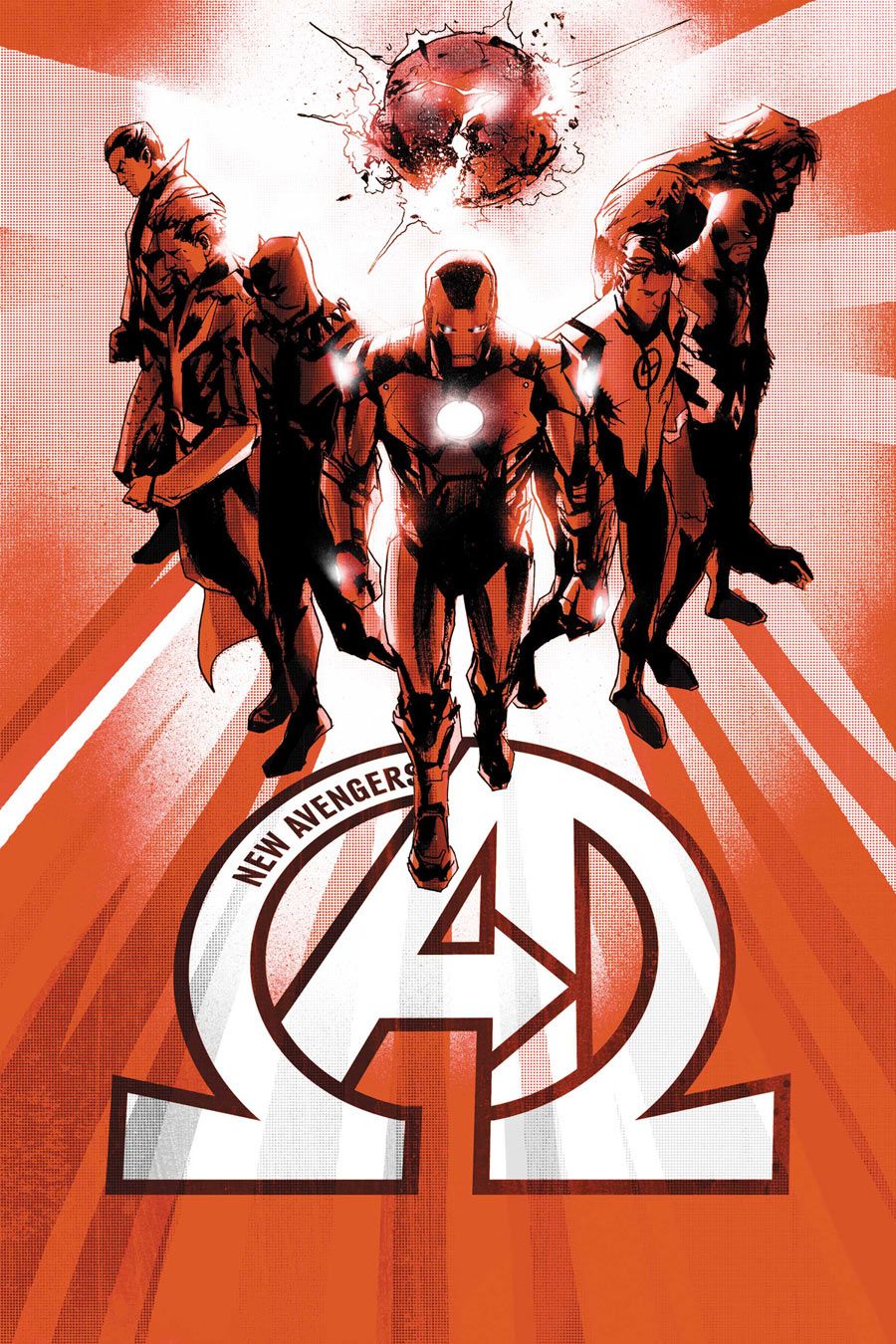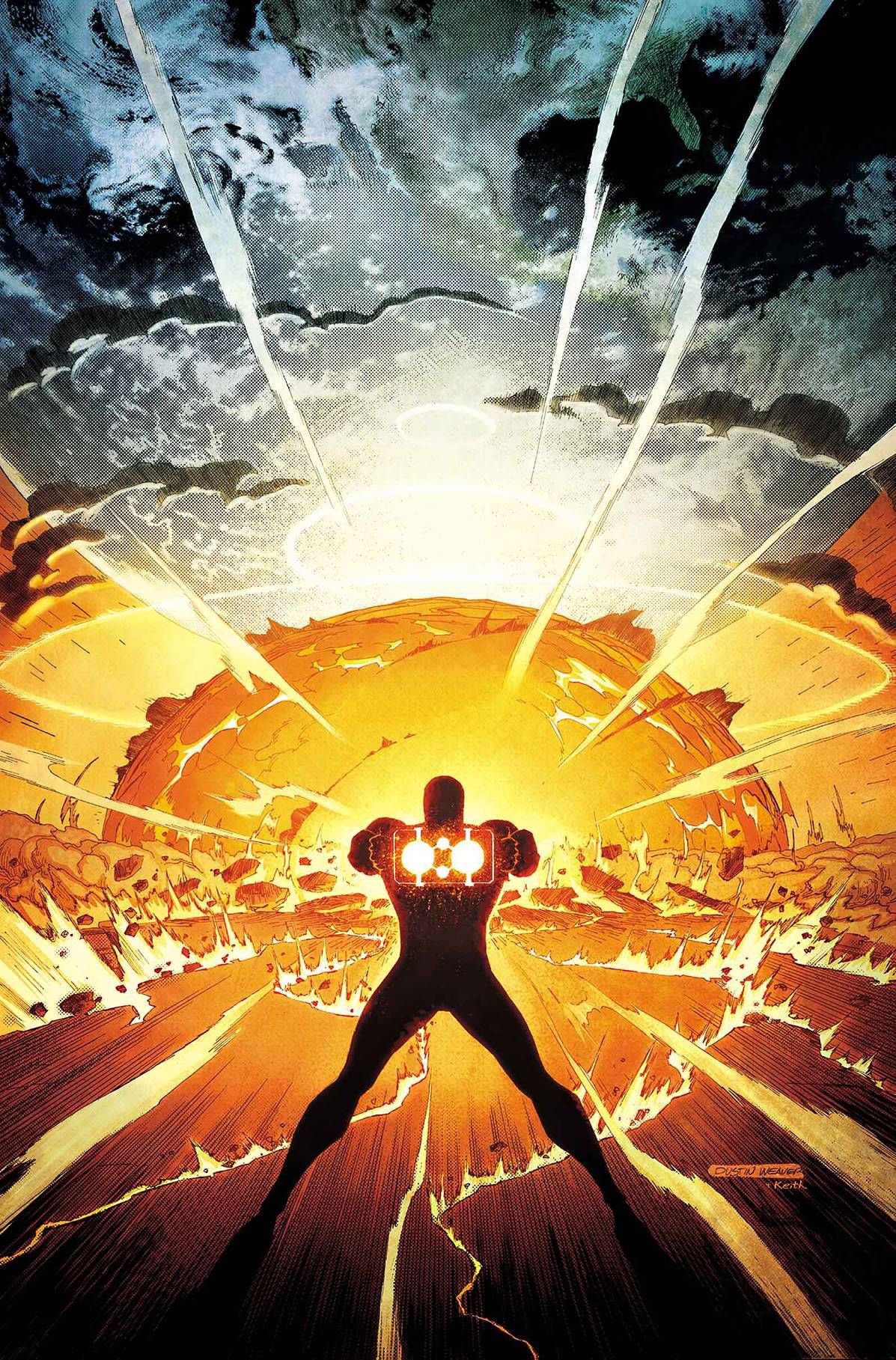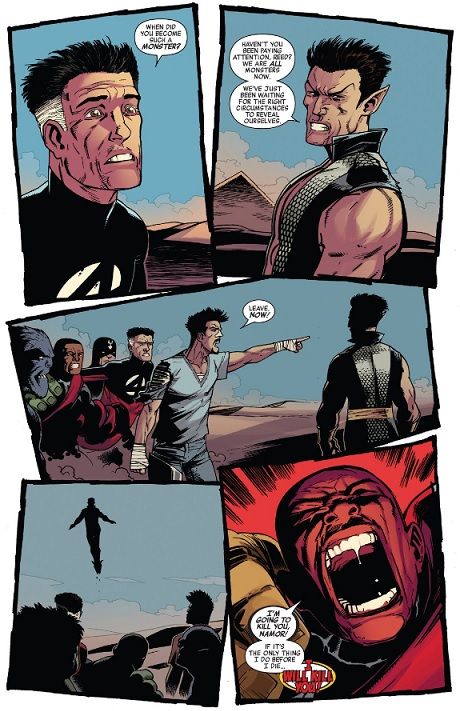Jonathan Hickman writes a dense story. I'd almost consider him the anti-Bendis in the matter/anti-matter chamber that is the Avengers. While Brian Michael Bendis focused on the small story (sometimes a bit myopically), Hickman branches out into the vast unknowns of space and reality, and presents stories in a massive scope and scale. He has complex, overarching plots that have enormous charts to keep track of timelines and major events. He creates mythologies for his own subcultures for readers to delve into. The threats his Avengers face are beyond the realms of mortal ken, which sometimes means beyond the reader's ken as well.
Don't get me wrong, I think it's great that the Avengers are facing down greater problems and dangers than, say, ninjas or hoodlums. If you're going to be the premier superhero team, you have to be challenged by something no one hero could face on her own. Giving the Avengers grand designs makes them seem more important and, therefore, more heroic when they succeed. On the other hand, sometimes a larger scope can be too large to grasp, and when the reader loses the personal interest of the story, it can be a chore to slog through. I'd be lying if it didn't seem like homework sometimes to figure out Hickman's builder/mapmakers/Ivory Kings/Black Priests cosmology, and that my eyes didn't glaze over during some issues as I waited for the heroes to do something spectacular.
Well, the wait is over! The last three issues of New Avengers have gotten us back into the game with a huge reveal, some personal triumphs and tragedies, and I feel more invested in this Incursion story than ever before. What's been going on? And why did it take so long to get to the fireworks factory? Read on!
WARNING: Spoilers (obviously) for the New Avengers #21-23.
New Avengers is the Illuminati book, where characters of great intellect and importance gather secretly to protect Earth from the unknown. They handle the threats that might be a little morally questionable for the Avengers because, honestly, they are a little morally questionable themselves. The usual crew from Bendis' original team is there: Reed Richards, Tony Stark, Black Bolt, Doctor Strange and Namor, but with Professor X gone, his position has been given to Beast. Originally, I wasn't sold on Hank McCoy hooking up with shadowy people making shadowy deals, but considering how much his character has changed and how questionable his own actions have been, it's a perfect fit. Steve Rogers was part of the team for a time, until he wasn't questionable enough in his morality to stay, Bruce Banner received an invitation because he discovered the Illuminati's existence, and Black Panther reluctantly joined in the wake of a literal crisis on infinite Earths.
Something unknown is pulling universes toward each other, with Earth as the focal point in each instance. One or the other universe will die, and the Illuminati has been working on ways to make sure we survive -- and possibly not have to destroy an entire universe to do so. At least, I think that's what's happening. There's a lot of stuff going on these past 20-odd issues, with the Black Swan, Super-Adaptoids, new worlds full of their own characters, wishes and dreams ... It's a lot to take in, and can easily overwhelm the greater purpose. Our heroes have been trying everything they can think of to stop these incursions, and none of them has been the magical solution . The Infinity Gauntlet can't hold it back, all the science and magic they can muster can't hold it back, and so they finally create a Kirby-esque device that can blow up the other Earth as it barrels toward their own.
And then the real story begins. New Avengers starts out with a sort of mantra every issue or so, the idea that everything must die, and whether you accept that fact of life. Reed Richards is normally the one speaking these words, and it's his scientific know-how that helps build a device that potentially kills billions of innocent people. Each of our heroes has sacrificed something to get us to this point, and why this book is so good and why the slog through all this information is worth it, comes from what those sacrifices do to them and who they become in the face of universal death.
They are the Avengers who face the problems and create the solutions that other people are too altruistic to do. As these men are leaders and heroes, where is the line drawn between savior and tyrant? Remember how last week I was discussing how threats have to escalate for heroes to overcome them time and again? Here, New Avengers kind of have their cake and eat it too as they face cosmic-level threats together that they couldn't face individually, but at the same time each hero faces a threat within himself that the group can't resolve together. Doctor Strange sells his soul for more power to stop the Incursions. Tony Stark mindwipes his best friend to keep him in the dark about the group's murky morality. Black Panther lets down his lineage because he chooses not to deploy their Earth-shattering device at the cost of his own soul. And Namor ...
Oh, Namor. As a man who has toed the line between hero and villain, not to mention someone who has recently tasted god-like powers from the Phoenix Force, the Prince of Atlantis is the only one of the Illuminati either strong enough or dangerous enough to use their wold-killing device on the approaching Earth and destroy it with the confidence that he's doing the right thing. The next issue is simply dealing with the fallout from that action, as Black Panther and Namor finally have it out in their silent war against one another. Namor is seen as a monster by his allies, while he view them as men who refused to get the job done. Which is why, at the threat of another Incursion, the Illuminati leaves to say goodbye to loved ones and await the end of the world, and a new Cabal rises to take their place.
It has been a slow build; Hickman has deep, deep plans that take a long time to get through. Calling him a world builder doesn't really explain how much care he takes in crafting these kinds of stories, there is so much more to it than simply populating a place with new characters. In his Fantastic Four run, there were a lot of slow issues to follow before Johnny Storm died in the Negative Zone, but after that crucial plot point, the books seemed to turn inwards and build upon all the foundations Hickman had carefully laid out before. These last three issues of New Avengers have a similar feeling, like this will be a big turning point in not just the book, but for these characters. We finally got the fireworks factory.




